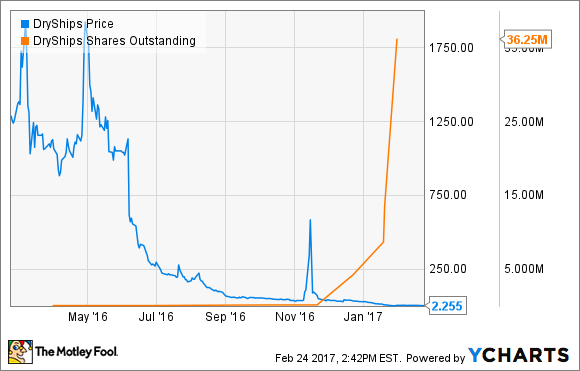While almost any stock at the right price has the potential to make for a successful investment, there are some stocks that are best left alone. Here's why DryShips (DRYS), Fiat Chrysler Automobiles (FCAU), and J.C. Penney (JCPN.Q) should be avoided.
The shipping giant that can't stop losing money
Travis Hoium (DryShips): Throwing money at DryShips is probably the riskiest thing investors can do in the market today. We have no idea what management is going to spend money on or even if they'll have shareholders' best interest at heart.
I highlighted this a few weeks ago when I showed how through a series of transactions CEO George Economou is lining his own pockets privately while diluting public shareholders. If you want a very simple view of this, you can look at the chart below. DryShips continues to dilute shareholders, destroying value in the process.
This got worse last week when the company announced a $200 million stock sale agreement that will be incredibly dilutive to shareholders holding the stock. It's no wonder that shares have dropped by more than 50% since the announcement.
Investing should be about buying a company you believe will generate earnings in the future and return profits to shareholders through dividends or a rising stock price. DryShips has done neither and seems more interested in buying assets from its CEO with shareholder funds than anything else.
Too many red flags
Daniel Miller (Fiat Chrysler Automobiles): To be fair, you could invest in many worse companies than Fiat Chrysler Automobiles, but in my opinion, this is still a stock to avoid. Some of the reasons are specifically to do with Fiat Chrysler as a company, and some reasons have to do with the broader industry -- let's dig in.
First, let's start on the front line: FCA's products. While Jeep remains wildly popular, FCA just turned in its fifth consecutive month of year-over-year sales declines. Further, while FCA's Ram Truck brand hauls big profits, FCA's Chrysler, Dodge, and Fiat brands have struggled mightily right here in North America, the world's most profitable market. Not only that, as you can see in the graph below from J.D. Power 2017 U.S. Vehicle Dependability Study, its products took up a majority of the industry's lowest ranks.

Image source: J.D. Power 2017 U.S. Vehicle Dependability Study.
Second, FCA still has much more debt than its Detroit counterparts. Consider that General Motors ended 2016 with a total automotive debt load of $10.8 billion, but could entirely offset that debt load with a cash and cash equivalent pile valued at $21.6 billion. In comparison, FCA ended 2016 with a total automotive debt load of $25.68 billion, and a cash and cash equivalent pile of $18.5 billion. FCA's debt is manageable, but it still puts the automaker at a distinct disadvantage compared to its fiercest rivals.
Finally -- and this is unfortunately out of FCA's hands but still a necessary consideration -- the highly profitable North American new-vehicle market is plateauing. Automakers have been able to ride a rising tide of consistently increasing new-vehicle sales and pricing, thanks to surging SUV and truck sales, but as the market peaks, expect competition to heat up, which will put pressure on the entire industry.
Fiat Chrysler Automobiles remains far healthier than it was during the Great Recession, and you could do worse as an investment. But as an automaker, there are too many red flags, and it remains a stock to avoid.
A stalled turnaround
Tim Green (J.C. Penney): Struggling department store chain J.C. Penney managed to break even in 2016, despite slumping sales, thanks to substantial cost-cutting and various one-time items. Comparable-store sales slumped 0.7% during the fourth quarter, a terrible result given how depressed the company's sales remain. J.C. Penney generated $12.5 billion of revenue during 2016, down from $17.3 billion in 2011.
Following the weak holiday results, the company now plans to close 140 stores and two distribution centers, offering early retirement to 6,000 full-time employees. The move will reduce J.C. Penney's store count by more than 10%, but it won't solve the fundamental problem facing the company. After an initial period of comparable-sales growth after sales bottomed out a few years ago, J.C. Penney has hit a wall.
J.C. Penney expects comparable-store sales to be flat, plus or minus 1%, in 2017. That's simply not good enough. An adjusted profit is expected thanks to further cost cuts, but a company can't cut its way to success. There's a difference between reducing costs to become more efficient and reducing costs because there's no other way to produce a profit. The latter isn't a strategy that works in the long run, especially for a retailer.




